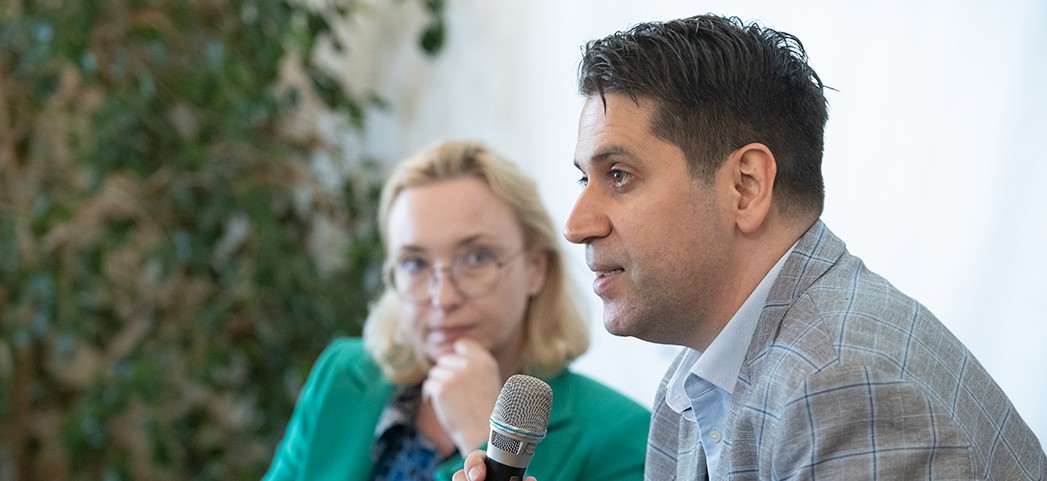
Hanna Hopko: Power of Information – Context of the integration into the EU and NATO
On Thursday, we delved into the pivotal role of information in the context of EU and NATO integration, guided by Hanna Hopko. Hopko highlighted the impending humanitarian crisis in Ukraine, anticipating a potential mass exodus due to Russia’s strategic control over power stations, which could render Ukraine uninhabitable during winter. She also underscored the historical manipulation by Russia, such as Peter I’s renaming of Moscow to Russia to appropriate Ukrainian historical heritage.
Hopko criticized the absence of a definitive victory strategy for Ukraine and the tepid response from NATO, advocating for more robust support and the unrestricted provision of Western weapons. She warned that Ukraine’s defeat would destabilize Europe, urging neighbouring countries to prepare for potential threats. During the Q&A session, Hopko addressed the tactical nature of Russia’s truce proposals, Ukraine’s aspirations for NATO membership, and the critical role of local community cooperation. She stressed the importance of authentic negotiations and discussed the need for comprehensive mental and physical healthcare for soldiers, alongside foreign assistance, particularly in securing power infrastructure during the winter.
Hopko concluded by emphasizing the global dimension of Russian expansion and the imperative for international cooperation, notably with countries like Poland, Japan, and Taiwan, in advancing new technologies. She articulated that the conflict has transcended a bilateral issue between Russia and Ukraine, evolving into a broader confrontation with autocratic regimes like Russia and China on one side and NATO and the EU on the other.
Gurkan Ozturan: Challenges And Solutions – Safeguarding Media Freedom in Europe – Media Freedom Rapid Response
For this second session of the day, we were joined by media expert Gurkan Ozturan who works as a media freedom monitoring officer at the European Centre for Press and Media Freedom (ECPMF). Additionally, he has years of experience as a Turkey rapporteur for Freedom House’s annual Freedom on the Net Report in digital rights and liberties activism. The organisation, ECPMF works closely with Media Freedom Rapid Response (MFRR) and other media groups advocating for media liberties including Free Press Unlimited and International Press Institute in Vienna, Austria. Today’s focal point was MFRR.
The presentation focused on the support available to journalists within EU or candidate countries who face continuous harassment, persecution, or any form of aggression due to their journalistic career. Co-financed by the European Commission, the organisation gathers data from various regions and currently monitors 1000 cases, revealing just a fragment of the turbulent nature of advocating for freedom of press. The gravity of the attack on journalism cannot be understated and the lecture revealed that the problem was not just with law enforcement, but also with ordinary people, who, particularly at protests, become violent towards journalists. One example was that of famous Italian-born journalist Antonella Napoli whose high-profile case caused a storm across Europe.
However, some efforts are being initiated to establish better relations between journalists and police officials through communication initiatives and agreements such as the Press Freedom Police Codex.
In the final minutes of the class, the lecture proceeded into a more practical application of the presentation material. The exercise required students to organise into small teams for a game of Support Cases for Journalists: To support or not support? In this role-play inspired activity, the teams put on the shoes of the MFRR and assessed several scenarios drawn from real-life cases of journalists. The task helped concretise the main goal of MFRR operations when assisting journalists with legal and practical or technical support. It was a wonderful activity that certainly probed good questions and reinforced the significance of teamwork.
Ersan Pekin & Dominika Kasprowicz: Freedom of Culture – Freedom of Speech – Freedom of Media
The following segment was led by our Director Dominika Kasprowicz with a special guest, Ersan Pekin, a Turkish journalist seeking asylum in the EU. It began with a brief presentation on the role of International Cities of Refuge Network (ICORN) in establishing safe havens for artists, journalists and writers fleeing persecution. ICORN, which has been operating since the 2000s, is an independent, international organisation spread across 70 cities, with its. Headquarters in Norway. Its members include Denmark, Spain, Estonia, Poland, Slovakia, Czechia and many others, and there was strong encouragement from Dominika to consider registering our cities for inclusion in ICORN.
This session, however, was not just an informative discussion on the role of the global community in safeguarding a crucial pillar of democratic society, it was also a testament of Pekin’s courage to leave his home, venture to a next one and continue to work a precarious job. Pekin detailed the torment of his work that led him to be assaulted, tortured, and falsely imprisoned by Turkish law enforcement. Pekin reached out to ICORN and they awarded him a fellowship at Villa Decius.
Upon arrival to Poland, he found the country strange and new, but he settled in and recognised the freedoms he had not been allowed in Turkey. In response to his remarks, the Director suggested that Pekin might have a better view of Poles than Poles have about themselves!
Transitioning out of Pekin’s life story, the discussion with the class was a mixture of questions and remarks regarding media representation of Turkey, the role of the New Pact on Migration and Asylum on creatives, and the changes needed in the Turkey’s political regime towards media. Pekin revealed that despite the loss of leaving one’s home and starting life somewhere new, he cherished that ICORN gave him the opportunity “to think, feel, and write without fear.”












